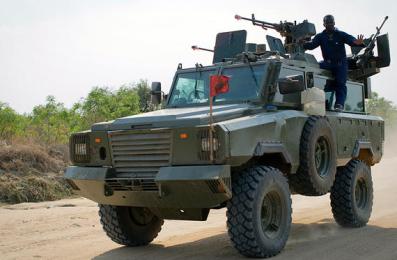Ugandan defence minister says troops will remain in South Sudan until regional force takes over
July 4, 2015 (ADDIS ABABA) – Foreign troops deployed to South Sudan from neighbouring Uganda will not withdraw from the war-ravaged country until an alternative regional force is deployed, Ugandan defence minister said on Saturday.

“We deployed a force to South Sudan whose government invited us to do so and we prevented genocide,” Kiyonga told Anadolu Agency after a meeting between Ethiopian and Ugandan ministers in Addis Ababa.
“We will withdraw from South Sudan as soon as the IGAD (Intergovernmental Authority on Development) Deterrent Force deploys. If invited we will be part of the IGAD force,” he added.
He expressed hope that very soon the East African stand-by force will be ready for deployment in South Sudan in order to fill the vacuum.
Uganda said it was the reason president Kiir’s government has remained in power otherwise the rebel forces would have captured Juba since January 2014, just one month after the crisis erupted on 15 December 2013.
Rebel forces were advancing speedily after they captured Jonglei state’s capital, Bor, in that January and successfully matched 110km towards the national capital, Juba. But the ill-equipped rebel fighters were stopped at 90km away from Juba by thousands of Ugandan forces backed by tanks, other armoured vehicles and helicopter gunships.
Ugandan troops for the past 18 months of the war have been on the ground in South Sudan and are still in charge of Juba’s security including its airport as well as Bor in Jonglei state. They also provide air cover for the South Sudanese army (SPLA) in other states of the oil-rich greater Upper Nile region.
While the southern neighbour insisted that its forces were invited into the war theatre by the South Sudanese government, both nations’ national parliaments had not deliberated on or endorsed such an action prior to the deployments, hinting that it was a confidential agreement between president Kiir and Ugandan president Yoweri Museveni.
However, the two defence ministers, Kiyonga of Uganda and Kuol Manyang Juuk of South Sudan afterwards signed a backup agreement on military cooperation. The agreement endorsed the continued presence of Ugandan troops on South Sudan’s soil as well as acquisition of weaponry as Kampala would be purchasing weapons on behalf of Juba.
South Sudanese opposition faction led by Machar on the other hand has been demanding withdrawal of the Ugandan troops from South Sudan’s territory, accusing Kampala of military interference in the internal conflict. They also said their presence on the ground was an impediment to peace as it allegedly encouraged president Kiir’s government to continue with intransigence against progress in the IGAD-led peace process.
South Sudan, which gained independence from Sudan in 2011, has been wrecked by fighting that has killed thousands and forced more than 2 million to flee their homes since December 2013.
Talks are expected to resume this July in the Ethiopian capital, Addis Ababa, to try to reach a negotiated political settlement to end the war.
(ST)
